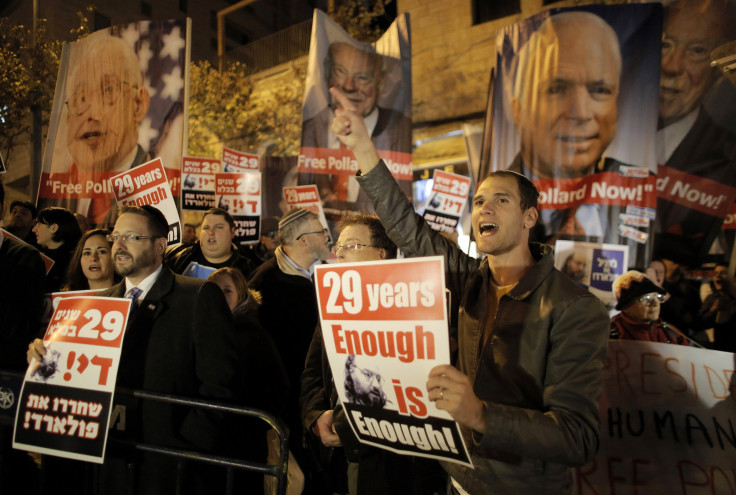U.S. Can’t Bribe Israelis, Palestinians To Make Peace

“First as tragedy, second as farce.” It’s Karl Marx’s line about history repeating itself but, per the Jonathan Pollard trial balloon of recent days, the line could just as easily apply to America’s foreign policy.
We need not debate the merits of Pollard’s release, for which supporters and detractors each can mount a compelling case, to acknowledge that Israeli-Palestinian negotiations aren’t the proper milieu for making the decision or that White House maneuvering over the possibility bespeaks an extraordinary ignorance, naivety, and desperation that dominates all-too-much U.S. foreign policy.
At the urging of U.S. Secretary of State John Kerry, President Barack Obama is considering an early release for Pollard, the former U.S. intelligence officer who’s serving a life sentence for spying for Israel, in exchange for Israel’s release of more Palestinian prisoners – all of it designed to prevent U.S.-sponsored Israeli-Palestinian peace talks from collapsing.
Ah, bribery as diplomacy.
Hopes that a Pollard-centric strategy could save the peace talks seem strikingly disconnected from what’s driving the Israeli-Palestinian conflict.
Yes, Pollard’s release would delight many Israelis. But, it won’t talk Israelis out of their deep skepticism that Palestinian statehood will do anything more than create a West Bank staging ground for rocket fire to match what’s already coming over the border from Gaza. And if it won’t convince Israelis, then it won’t prompt their popularly elected leaders in Jerusalem to act otherwise.
Israeli skepticism is warranted, for just as Washington dangled prospects of many more released prisoners before Palestinian Authority (PA) President Mahmoud Abbas, he announced plans to seek Palestinian membership in 15 international agencies and conventions -- that is, de facto global recognition of a Palestinian state. That, of course, violates Palestinian commitments to achieve statehood through Israeli-Palestinian negotiations rather than bypass the talks and seek it through other means.
Meanwhile, Palestinian leaders continue to refuse recognition of Israel as a Jewish state for the simple reason that, were they to do so, they would concede the reality that Palestinian refugees will have no full “right of return” and Palestinians will have no state “from the [Jordan] River to the [Mediterranean] Sea.”
That the United States, Israel, and the PA find themselves where they are, with the talks moribund, was all too predictable. That’s because the deal Kerry was cooking up to rescue the peace talks suffered from the same fundamental problems as Obama’s longstanding approach to the conflict.
Once more, Washington was pressuring Jerusalem for concessions (though, this time, sweetened by Pollard’s release) without asking anything of the Palestinian side. Israel would release hundreds of prisoners and limit settlement expansion, and Palestinian leaders would merely refrain from anything that would undercut the talks -- such as the very act that Abbas subsequently announced.
Once more, with Washington pressuring Jerusalem, Palestinian leaders dug in their heels, reinforcing their bona fides to their own people by taking a harder line against Israel than Washington was taking. By angering both Washington and Jerusalem, Abbas’ quest for global recognition fits that bill nicely.
If Washington’s latest efforts at Israeli-Palestinian peace-making seem clumsy and misguided, they fit into a far more disturbing picture of how the United States sees the world and where it applies its energy.
That Obama and Kerry continue to focus so heavily on this conflict reflects their misbegotten belief that it’s somehow the key to greater things -- that it will pave the way for broader Arab-Israeli peace, ease tensions across the region, and facilitate progress on issues like Iranian nukes and Syrian horrors.
That they continue to focus so heavily on this conflict also reflects their skewed priorities, for it comes against the backdrop of Russia’s aspirations that extend beyond its recent annexation of Crimea; of Syria’s horrific civil war that seems ever likelier to end with President Bashar al-Assad still in place; and of Iran’s questionable commitment to a nuclear deal that would ease legitimate concerns in the West.
Have Obama and Kerry heard nothing from our allies in the Middle East who worry far less about Israeli-Palestinian peace and far more about America’s continuing commitment to ensure regional stability in the face of Iran’s hegemonic ambitions, or our allies in Europe who worry far more about Russia’s geographic hunger, or our allies in Asia who worry far more about China’s assertiveness?
Most of all, do they not recognize that in their obvious desperation to strike an Israeli-Palestinian peace deal that neither party wants, they look, at best, misguided and, at worst, more than a little pathetic?
Lawrence J. Haas, former communications director for Vice President Al Gore, is a senior fellow at the American Foreign Policy Council and author of “Sound the Trumpet: The United States and Human Rights Promotion.” Follow him on Twitter @larryhaasonline.
© Copyright IBTimes 2024. All rights reserved.





















